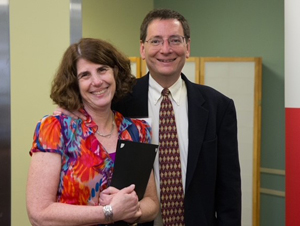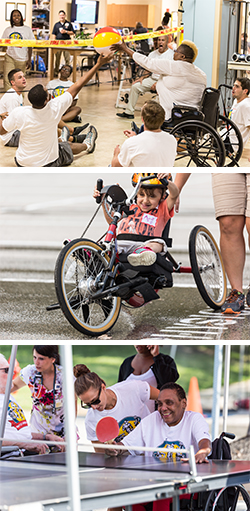 It is no secret that exercise and playing sports not only have physical benefits, but mental and emotional advantages as well. The Adapted Sports Program at the University of Maryland Rehabilitation & Orthopaedic Institute (UM Rehab & Ortho) embraces this reality and uses sports as a means to heal patients—in mind, body, and spirit.
It is no secret that exercise and playing sports not only have physical benefits, but mental and emotional advantages as well. The Adapted Sports Program at the University of Maryland Rehabilitation & Orthopaedic Institute (UM Rehab & Ortho) embraces this reality and uses sports as a means to heal patients—in mind, body, and spirit.
Dr. Alan Levitt and his wife Dr. Janice Finkelstein have long been philanthropic supporters of the Adapted Sports Program, which oversees activities like basketball, golf, and rugby. Every year they sponsor the Mix and Mingle Golf Tournament, which pairs golfers with and without disabilities for a day of friendly competition. The couple will be honored for their steadfast support at the upcoming Kernan Golf Tournament this spring on May 23rd.
“The Adapted Sports Program is something that we will continue to contribute to. It is important to us and the more expansion of adapted sports, the better.”
Both Dr. Levitt and Dr. Finkelstein are flattered by the recognition but maintain that it belongs to the incredible team of care providers at UM Rehab & Ortho. The commitment of the physicians, nurses, therapists and staff inspires them to give back to the program year after year.
“It’s a whole lot easier to write a check than to do the work,” says Dr. Finkelstein. “There are so many people who work at UM Rehab & Ortho who really care about their patients and go above and beyond their job duties.”
The expert team at UM Rehab & Ortho helps patients recover from a spectrum of serious events, including strokes, traumatic brain injuries, spinal cord injuries, amputations, and severe illnesses. Activities through the Adapted Sports Program offer many benefits including improved physical strength, range of motion, flexibility, and endurance; improved emotional wellbeing; increased social interaction with others who face similar challenges; and the opportunity to engage in competition.
“To golf, for example, you have to be able to stand, you have to balance, you have to hold the clubs, and you have to plan your shot,” explains Dr. Levitt, who worked at UM Rehab & Ortho for decades and was once the director of its Stroke Rehabilitation Unit. “It requires so many different activities that involve the legs, the hands, and the brain. Getting people up and encouraging them to participate in these activities aids them in their recovery.”
Dr. Levitt joined the University of Maryland faculty in 1987 after he and his wife moved to Baltimore from Omaha, Nebraska. An internist, Dr. Levitt was given the responsibility to run the rehabilitation unit at Montebello Hospital. At the time, he had little experience in that area of medicine.
“I knew nothing about it, and I thought eventually I would move to the downtown campus,” Dr. Levitt recalls. “But it turned out to be the right place and where I belonged.”
Montebello Hospital eventually closed and the rehab unit moved to Kernan Hospital, which is UM Rehab & Ortho today. From 1996 to 2006, Dr. Levitt served as the Chief of Medicine and Director of the Stroke Rehabilitation Unit; and from 2004 to 2006, he also served as President of Medical Staff.
 “It’s a labor of love. It’s a challenging job. It’s physically demanding and mentally demanding,” Dr. Levitt explains. “UM Rehab & Ortho gets tough cases and people who come from the R Adams Cowley Shock Trauma Center. After a major trauma, the patient is happy the hospital kept them alive—but when they come to us, suddenly it’s the realization that they have to get back to what they want to be, and they may not be able to get there totally in their goals.”
“It’s a labor of love. It’s a challenging job. It’s physically demanding and mentally demanding,” Dr. Levitt explains. “UM Rehab & Ortho gets tough cases and people who come from the R Adams Cowley Shock Trauma Center. After a major trauma, the patient is happy the hospital kept them alive—but when they come to us, suddenly it’s the realization that they have to get back to what they want to be, and they may not be able to get there totally in their goals.”
Dr. Levitt credits Pam Cauley, a recreational therapist who he worked with for years at UM Rehab & Ortho, for bringing to light the importance of exercise and rehabilitation—not just for the physical recovery of the patient, but for enjoying their quality of life.
“A patient would come to our unit and you could just see it in their face. They felt hopeless, like their life was over. Suddenly, they’ve gone from being able to do everything to now thinking they would no longer be able to do anything for the rest of their lives,” Dr. Levitt explains. “One of the things we tried to do as a team is try to find what is their spark? What is the thing that is going to get them going to realize that yes—this happened and things won’t be exactly the same. But you can still enjoy yourself and enjoy life.”
The Adapted Sports Program continues to inspire patients every day to get back to living. In 2006, Dr. Levitt stepped down from his leadership positions at UM Rehab & Ortho after receiving a diagnosis of multiple sclerosis. Yet, he remains a strong influence through his service on the Board of Directors from 2007 to 2013 and his family’s continued philanthropy.
“As I have gone through my own functional limitations, I have a better understanding of what it must be like for somebody who experiences a trauma and has challenges that are much more difficult than mine,” Dr. Levitt says. “The Adapted Sports Program is something that we will continue to contribute to. It is important to us and the more expansion of adapted sports, the better.”